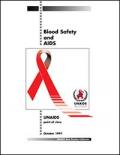Publications - Released in 1997
The human immunodeficiency virus (HIV) is efficiently transmitted through blood transfusions. The probability of becoming infected through a transfusion of blood tainted with HIV is estimated at over 90%. In contrast, risk through a single act of sexual intercourse ranges from a few percent to less than one percent. And the dose of HIV in a single blood transfusion is so large that an adult infected in this way may quickly develop AIDS - on average within three to five years (two years in children).
Blood transfusions save millions of lives each year, but in places where a safe blood supply is not guaranteed, those receiving transfused blood have an increased risk of being infected with HIV.
Downloads
Download Publication(118.58 KB)
Organizations
- Joint United Nations Programme on HIV/AIDS (UNAIDS)






